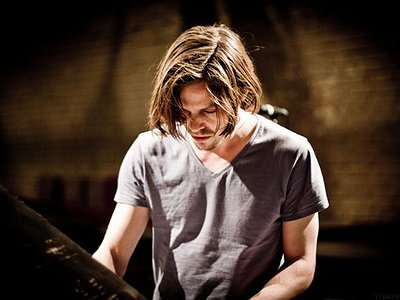When did you start writing/producing music - and what or who were your early passions and influences?
As I'm sure you hear a lot from other musicians, it's really hard to say. I learnt a bit of cello when I was very young, but don't remember trying to write anything on that. Then a bit later I got bored of cello and wanted to play guitar, and I remember trying to work out little songs from the day that it arrived. Following that was the usual stage of forming terrible rock bands for a while, starting while I was still at primary school, and then a bit later at secondary school I discovered/was allowed to discover the little cupboard recording studio that the school had - it was the tiniest studio I've ever seen to this day - I think
it was actually inside what used to be a walk-in cupboard! They had a rack-mount eight channel hard-disk recorder and an old mixing desk, along with some outboard effects and a few microphones. I used to spend my lunch-breaks in there, trying to figure out how things worked and making strange sounds - which is basically what I do to this day. For instance, one of the only things I could do with the hard-disk recorder was pitch down sounds to half-speed, and for some reason that simple technique has stuck with me - something is being still played at half-speed in almost every track I've ever made.
Later I bought the same recorder and a mixer and so had a way to record at home. The computer came a bit later - at first I was just using it to generate drum patterns and little synthesizer lines, and I clearly remember the day that I realized you could also record INTO the computer. No one was teaching me, so I had to learn even that for myself, and it definitely changed the way I worked - as it became easier to edit sounds and I wasn't limited to recording only eight tracks per song. Now I am really turning against working within the computer, but at the beginning it would have been impossible without it.
What do you personally consider to be the incisive moments in your artistic work and/or career?
As I mentioned, beginning to explore my school's recording studio is probably one of them. But I think the biggest has to be from around five years ago now, when I completed my first extensive solo tour and then promptly moved to Berlin. That is when I gave up my day job and could begin to focus on music in a more concentrated way. That meant I had much more time to play concerts, more time to spend in the studio. I had also just moved to a vibrant capital city, full of interesting concerts and an audience for the kind of music I was listening to at the time, which was quite influential in terms of working out what I wanted to do and what I didn't want to do.
When I first moved to Berlin, I was going to two or three concerts a week, or more, and I remember how amazed I was that there was an audience at each one of these shows, no matter how abstract or niche they were. In England I had only met an extremely limited amount of people who were interested in the same kind of things as me, and in moving away from England a whole world opened up and in it I found the possibilities and encouragement to continue doing what I was doing.
What are currently your main compositional- and production-challenges?
Compositionally, I am struggling a lot with melody at the moment - every time I begin to play something melodic I feel like I am just repeating myself in a way. Right now, I'm quite sick of it.
On the latest album, melody mainly serves as a functional element; merely as some kind of narrative tool to carry the listener through the textures and the rhythms that unfold. Every melody on the new album is extremely simple, they could sound really boring in other contexts, but it is the character of the sound itself that gives them weight and interest. Having said that, a good melody is something timeless. I'm just trying to find, or re-find, my voice between the history of beautiful melodies that are already out there.
In terms of production, I suppose my main challenge at the moment is to try to develop that aforementioned "character of sound" into a unique and distinct signature that is recognisable through everything that I do, and can be implemented here in my studio during every stage of the process, from recording to mixing to perhaps even mastering my own work in the future. Part of this takes time, and part of it relies on collecting the right kind of equipment, which takes money.
What do you usually start with when working on a new piece?
Almost always, a piece starts with just a single sound. It might just be a certain type of tape hiss, or an acoustic sound that is processed so heavily that it begins to reveal other details within itself. From there I can begin to hear other elements, and things build up in a kind of block-by-block way until I can no longer imagine any other elements to add, and then I know the track is finished.
How strictly do you separate improvising and composing?
I don't really separate them at all. I have some projects that use only pure improvisation (such as The Alvaret Ensemble), and then I create work for some projects that is entirely scored, such as a score for The Royal Ballet that I have just finished writing for a ballet by David Dawson - but I don't really see the processes as that different from each other. With my studio albums, most takes are improvised, but then often edited or deleted entirely, so that kind of work exists somewhere between the two approaches.
Everyone who is improvising is composing; they are just composing through improvisation. I suppose the only difference is that when composing in the traditional, western, score-based way, you have the ability to turn back time in the creative process: you can try one note, and if it doesn’t work you can take it back and try another, and so in a sense it is more refined. But, at the risk of sounding too transcendental, through improvising you can, at best, tap into something that exists on a different level of consciousness, something that is further from the self but also truer to it, and then some really incredible music can be created.
How do you see the relationship between sound, space and composition?
I think it is different in a live setting compared to on an album. When creating an album, you never know where it will be listened to, what the setting will be, what the sound will be like there, or what the dimensions of the space will be, so you have to create something that exists within its own space, and that effect has to be translatable in many different situations that are out of your control. With a live show, I think the sound and the space can define the composition so completely that they are almost the core elements, within which all the composition has to do is exist. When playing in a bad-sounding room with a bad PA, I feel like the compositions are completely lost - they are saying nothing. That can be really hard when touring. But when everything is good, and the sound and space of the room are complementing the music, this can be the ultimate way to experience music, as then the performer can find his place between all of these elements at the same time as using them all to his advantage.
Do you feel it important that an audience is able to deduct the processes and ideas behind a work purely on the basis of the music? If so, how do you make them transparent?
That’s a really good question, and one that I have been asking myself a lot recently, and also during the creation of the last album. I think the new album is much more "hands-on" sounding, and more explicative of the way it was created than my past work. You can hear machines being turned on, or crackles as old dials are being turned - I think you can hear the music being crafted by one person, one layer at a time.
Recently, I've been recording a lot of stuff that exaggerates that idea to its logical conclusion, where every sound the machine can make is a musical one and should be utilised. Of course, I must add that I am only really talking about analogue equipment. When something like a computer is doing something "wrong" to the material, it just sounds terrible, even painful, but the inaccuracies of old equipment are what make them fascinating, and that is something I would really like to emphasise.
I was trying to make a little drum-loop yesterday using an old tape delay, and as I was working I realised that the tape was really over-used and it started to make weird sounds on its own as it span around. In the end that turned out to be a far nicer sound that the drum-loop, so I scrapped the drums and just kept the machine noise.
In how much, do you feel, are creative decisions shaped by cultural differences – and in how much, vice versa, is the perception of sound influenced by cultural differences?
I find it impossible to answer that really, as I have only ever heard sound through my ears and experienced culture through the bias of my own upbringing. I have no idea how my music sounds to other people, or any other music for that matter. However, I do feel that in the western world, the purpose of music has been distorted into a thing that is there to consume, it is just content now, whereas in other cultures, music is still something to participate in, it has more of a social relevance.
In general now, it seems culture is being crafted and homogenised by companies that have only a financial stake in its well-being. Take a company like Apple for instance. They want everyone to purchase their music exclusively on iTunes, so they design their new computers without a CD drive, so people can't play their old CDs anymore because everyone threw away their CD players when they realised they could just play CDs in their computers. As we see now, people just listen to music on their tiny laptop speakers - I would say the vast majority of laptop or iPhone users never plug their device into an external speaker system. The sound of music itself is changing, as producers and mastering engineers are making music to sound good on the worst common denominator set-up. That is just one example of one company, with one small step, affecting culture on a global scale. Maybe the way you are choosing to listen to music is more of a social difference than a cultural one, but I think this is affecting people's perception of sound more than other factors, for instance geographical or economical.



